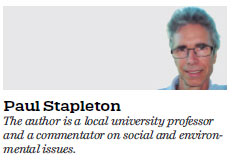Breastfeeding is best feeding, whatever TV ads tell you
Updated: 2018-03-12 06:37
By Paul Stapleton(HK Edition)
|
|||||||
Watching local television it is hard to miss commercials for baby milk powder. Images of happy babies and loving mothers fill the screen while the voice-over reassuringly explains how their product will provide a healthy start to life. Infused into most of these commercials are scientific-sounding terms that are surely unfamiliar to all but a few viewers. For example, the term DHA finds its way into many of these commercials but one wonders how many mothers know docosahexaenoic acid is an omega-3 fatty acid found in many foods, especially fish. DHA is known to be important in infant brain development. Perhaps this is why it is in human breast milk, which just happens to be the perfect food for babies.
Somehow our species has managed to survive until the present era largely without the help of baby milk powder with its DHA (or HMO - don't ask) and other similar ingredients with multi-syllable names. Yet the message from these TV commercials tends to reach the ears of mothers when they are most susceptible. It seems anything that gives an advantage to their newborn progeny deserves their attention and patronage.

Large multinational companies are well aware of this vulnerability and exploit it to the max. Thus, the recent accusation by an overseas advocacy group against Nestle about their unethical advertising practices is certainly appropriate but long overdue. This advertising has been criticized for manipulating consumers' emotional responses. While it is true that baby milk powder is a reasonable substitute for breast milk, it still lacks the living substances, such as antibodies and immune-system compounds necessary for defending against diseases early in life. In a word, there is no perfect substitute for the real thing.
For years, baby milk powder makers have touted their products under the guise of cutting-edge science to gullible mothers who are apparently impressed by the "science". Even the word "formula", which has become almost synonymous with baby milk powder, implies a scientific approach to formulating the ingredients.
The reality is more likely to be that these companies can cherry pick results from published studies in nutrition that happen to align with the positive effects of the ingredients already in their products, and then ipso facto claim their product is especially healthy. Either that, or when a new study comes out singing the praises of a certain element or vitamin - Vitamin D and DHA come to mind - it becomes the ingredient of the month and makers add it to their formula. Of course, they are not lying in the TV commercials; "deception" is a better word. In the end, it is not as if all of these scientific-sounding elements are absent in the babies' natural daily diet. However, the way the commercials promote the science behind their product, with their graphics of chemical formulas and the like, leaves the impression the companies' powder is even an improvement on the real thing, i.e., human breast milk.
This deception makes me wonder whether the local population is especially susceptible to misleading advertising. In a town where feng shui masters are paid large sums to advise on architecture and positioning of proposed buildings, clearly we live in a culture where even the elite fall prey to dubious claims and practices.
When considering the number of suspect beliefs in this town, I suppose, components such as DHA or HMO sound very scientific and can easily persuade naive consumers, who simply want the best for their offspring. Further, when the claims are made by well-known international companies with a well-established brand, the trust among mothers is often enhanced.
The irony about this marketing drama is that milk powder makers tout their product as being very close to a human mother's breast milk - thereby acknowledging the latter is an even better product, and also free. But it's a fact mothers throughout the ages already knew!
(HK Edition 03/12/2018 page8)